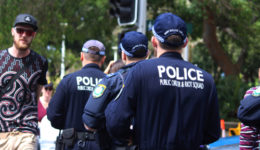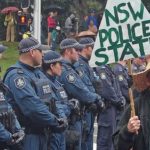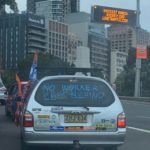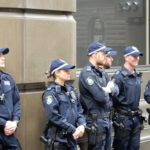COVID-19: Over-Enforcement Is Undermining Confidence in the Police Force

Amnesty International has added its voice to the growing calls across Australia for police to release the guidelines being used to enforce COVID-19 distancing regulations.
Over the Easter weekend, after sending a strong message to all Australians to ‘stay home’ police had a strong presence in our communities and on our roads, and were using number plate recognition technology and high definition cameras to catch anyone out and about without a ‘legitimate’ excuse.
During the 4-day long weekend, more than $1 million in fines were handed out to people ‘flouting’ the rules.
The rules keep changing
But the rules, as has been pointed out many times since they were first introduced, are vague at best. They also keep being changed and updated. For example, you can sit next to a person on a train or a bus, but you can’t sit on a park bench by yourself. A parent or guardian can supervise a family member who is a Learner driver for practice on the roads, but you can’t go for an idle drive alone. You can go for a push bike ride, but not a motorcycle ride. Once upon a time you could go to the beach, but many are now closed, and some are enforcing a ‘locals only’ policy without a crystal clear definition of what it means to be ‘local’.
Inconsistent policing and ‘vague’ definitions
For their part, police have also shown a great deal of inconsistency in the way these regulations are enforced, and on the whole, particularly in New South Wales and Victoria, they’ve taken an extreme hardline stance. In many cases issuing fines without warning, and the penalties are severe. Inadvertently doing the wrong thing will cost you a minimum of $1,000 for individuals and $5,000 to businesses in New South Wales, but under the Public Health Act, police are able to hand out fines of up to $11,000.
Each state and territory has its own set of rules and enforcement which just makes things more complicated. But it would appear that so far, New South Wales and Victorian police have taken the strictest stance on enforcement and there are concerns that marginalised groups in our society, such as the homeless who have nowhere to go during the Covid-19 crisis, and .
Indigenous children and teenagers who are already over-represented in the criminal justice system are being unfairly targeted.
Fines are severe
Add to that the many millions of Australians now out of work, with no future job prospects on the horizon, who have been slapped with an exorbitant fine they will struggle to pay.
According to the tourism industry there are also an estimated 60,000 travellers on our roads currently – some visitors who have had to cut their great Australian road trip adventure short, only to find out they cannot get home, as well as a large population of ‘transients’ – of no fixed abode, but who have been shut out of caravan parks and camping places.
They’re not the only ones, many otherwise ‘ordinary’ Australians have faced harassment too.
A Melbourne family was questioned by Police for sitting outside their home. A man with terminal cancer sitting alone in his car at Coffs Harbour was given a move on order by Police, and another Melbourne Family was handed a fine after posting ‘holiday snaps’ on Facebook. The photos were 12 months old.
Website to report police
A new website, Covidpolicing.org.au, which has been set up to record and report instances of police overreach, received 28 reports of inappropriate or concerning police interactions as a result of COVID controls in its first week.
Amnesty International is urging Police to release clear and consistent guidelines as soon as possible. As the organisation points out, “public trust in police is absolutely essential for managing this crisis, and controversial early incidents directly undermine this goal.”
“We understand the need for restrictions on movement in response to a one-in-100 year pandemic, but that response should still have human rights at its core and should be proportionate and applied with common sense.”
Guidelines would ensure consistency in the application of fines, as well as promote police accountability, and importantly – provide comprehensive information to the general public, so we can all understand our rights, and exactly what would be considered an infringement.








